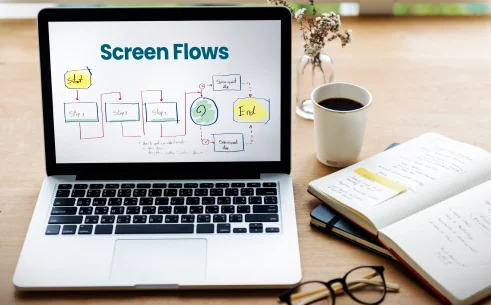Table of Contents
A Salesforce consultant is a person who advises businesses on establishing and customizing Salesforce as needed by the business. This kind of role usually combines both Salesforce knowledge and an understanding of the business and client management expertise
We have compiled the crucial Salesforce Consultant interview questions to help you prepare, and these questions are sorted by experience level. If you are aiming for a technical consultant position, we have included questions required for Salesforce Senior Technical Consultant and Associate Technical Consultant interviews.
Additionally, we have added scenario-based questions to help you confidently address real-life obstacles.
Salesforce Consultant Interview Questions
Here are the common questions asked at the interview for a Salesforce consultant role:
1. What is Salesforce, and why do companies use it?
Salesforce is a cloud-based customer relationship management (CRM) platform that manages sales, customer service, and marketing. Companies use this platform to improve their processes and interact with customers efficiently.
2. What are the main modules of Salesforce?
The main modules are Sales Cloud, Service Cloud, Marketing Cloud, Commerce Cloud, and Experience Cloud.
3. What is the role of a Salesforce consultant?
A Salesforce consultant allows businesses to implement and customize Salesforce solutions according to their needs and align them with their business objectives.
4. What is the difference between standard and custom objects?
A standard object in Salesforce is any predefined object such as accounts, contacts, etc, whereas Custom objects are designed and built by the user according to the data he wishes to store.
5. How will you design a report in Salesforce?
Reports can be created using the Report Builder. You select the report type, add filters, group data, and choose the desired fields to display insights.
6. Describe how you manage large-scale data migration projects in Salesforce.
Data tools like Data Loader have to be applied to ensure data cleaning, correct mapping, and proper loading order. Validation is also done post-migration to ensure the accuracy of data.
7. What is Salesforce’s sharing model, and how does it work?
A combination of profiles, roles, and sharing rules ensures that Salesforce can access data securely. It allows businesses to maintain data security while giving users access to relevant information.
8. What is the difference between Process Builder and Flow?
Process Builder would be used for simple automation, but Flow is powerful and could be handled for complex logic that incorporates user interactions and multi-step approvals.
9. How do you ensure a successful Salesforce implementation?
I take a systematic approach that includes collecting requirements, planning, configurations, testing, and user training. It also comes with proper communication with key stakeholders.
10. Could you briefly explain your experience with Salesforce Communities?
I have created communities using Experience Cloud to help customers and partners connect with businesses. I ensure the design aligns with the brand and the community meets the expectations of the user.
11. Have you ever integrated Salesforce with external applications? How?
Yes, I’ve used APIs and tools like MuleSoft for integration. I ensure that the data flow is smooth and monitor for errors post-integration.
12. How do you gather and manage business requirements?
I do discovery sessions, document requirements, prioritize them according to business impact, and work closely with stakeholders so nothing slips.
13. What KPIs do you monitor after implementing Salesforce?
The main KPIs include user adoption rate, data correctness, and business unit-specific metrics like sales conversion rate and service resolution time.
14. How do you resolve post-deployment issues?
I monitor the system for errors, gather user feedback, and ensure ongoing support is available. I also perform periodic health checks.
15. Can you share an example of a challenging Salesforce project you managed?
I led a project where we migrated data from multiple legacy systems. We faced challenges with duplicate records and had to create custom deduplication logic to ensure a smooth migration.
Salesforce Technical Consultant Interview Questions
Technical consultants focus on coding, customizing, and integrating Salesforce with other systems. Here are the following questions you might encounter:
16. How do you write efficient SOQL queries?
I use selective filters and limit the number of fields queried to avoid hitting governor limits.
17. What’s the difference between managed and unmanaged packages?
Managed packages are controlled by the publisher and allow updates, while unmanaged packages are open and customizable.
18. How do you use Lightning components?
Lightning components allow me to build dynamic user interfaces with reusable components.
19. What are sandboxes, and how do you use them?
Sandboxes are copies of your Salesforce environment used for development and testing without affecting production data.
20. How do you handle security settings in Salesforce development?
I configure profiles, roles, and permission sets to control access and ensure data security.
21. How would you design scalable Salesforce solutions?
I would use factors like data volume, governor limits, and future scalability. Also, I would design with modularity in mind so it makes maintenance easier.
22. What are Apex triggers, and how do you use them?
Apex triggers can be used for performing actions before or after the events in the database. In complex business logic where traditional tools can’t do so, Apex triggers become important.
23. How do you solve performance issues in Salesforce?
I check the query logs. I optimize SOQL queries. I monitor governor limits for Apex. Also, I look for unessential automation that may negatively influence performance.
24. What are synchronous and asynchronous processing?
Synchronous processes occur in a snap, as opposed to asynchronous running, which is done in the background and is ideal for long-running operations.
25. Tell me how you would explain what you do in a high-level, complex project while integrating with Salesforce.
You can integrate Salesforce with any ERP system using REST API with non-resistant data streamed into it, and an error mechanism in case data in both systems is mismatched.
Scenario-Based Salesforce Consultant Interview Questions
Scenario-based questions are vital for the interviews of the Salesforce consultants, as this demonstrates how effectively you can use your knowledge in real-time scenarios. It tests how well a candidate can present himself regarding solving problems with flexibility in a real-time scenario of tools provided by Salesforce.
26. A client complains about low user adoption after a Salesforce rollout. How would you address this issue?
How to Approach:
- Start by gathering feedback through surveys or meetings with end-users to understand the issues.
- Identify if the problem lies in system usability, lack of training, or gaps in the configuration.
- Provide additional user training, simplify workflows, and customize the interface to align with user needs.
- Introduce quick wins, like automating repetitive tasks, to demonstrate value and encourage adoption.
27. During the implementation phase, the client changes their requirements multiple times. How would you handle this situation?
How to Approach:
- Communicate the impact of frequent changes on the timeline and budget with stakeholders.
- Use an agile approach, breaking the project into smaller sprints to incorporate evolving requirements.
- Create a change request process to ensure that only high-priority changes are implemented.
- Maintain a clear project roadmap and keep all stakeholders informed about any adjustments.
28. You are asked to implement a multi-step approval process involving several departments. What’s your plan?
How to Approach:
- Use Salesforce Flow to build the approval process, ensuring it reflects the required sequence of approvals.
- Configure automated notifications to alert approvers at each step and keep all relevant users updated.
- Implement parallel approval processes if approvals from multiple departments are required simultaneously.
- Test the process thoroughly to ensure it works seamlessly before rolling it out.
29. A client wants to integrate Salesforce with their legacy system, but limited documentation is available. What steps would you take?
How to Approach:
- Begin by analyzing the legacy system’s data structure and workflows with help from the client’s technical team.
- Use Salesforce APIs (REST/SOAP) to establish communication between the two systems.
- Develop a data mapping strategy to ensure consistent data transfer between systems.
- Plan a pilot integration for testing before rolling out the full integration to avoid errors and disruptions.
30. You encounter governor limits during development. How would you resolve the issue?
How to Approach:
- Review the code to identify any SOQL queries inside loops or unnecessary triggers and optimize them.
- Use batch processing to handle large data volumes efficiently.
- Leverage asynchronous methods such as future calls or queryable Apex to offload long-running processes.
- If needed, collaborate with the client to adjust the business logic to ensure the solution stays within Salesforce’s governor limits.

Winding Up
Getting ready for a Salesforce interview can be challenging, but by having the right set of questions, you will enter the interview room with confidence. These Salesforce consultant interview questions range from fundamental concepts to advanced technical subjects and real-world situations.
Practising these questions will equip you with confidence whether you apply as a consultant or for technical positions as a Salesforce Senior Technical Consultant.
Join our newsletter: Get daily update on Salesforce career insights & news!
Join Now!
















